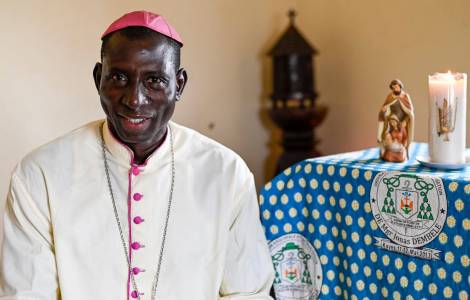
Facebook missio München
Bamako (Agenzia Fides) - "Since 2012, Mali has been in a multidimensional crisis: security, institutional and economic," says Jonas Dembélé, President of the Episcopal Conference of Mali and Bishop of Kayes, in an interview with Fides.
How is the Church in Mali experiencing the crisis that has gripped the country since 2012?
Recently, the crisis has been aggravated by the actions of jihadists and the spread of criminal gangs. As a Church in Mali, we are affected by this violence, but jihadist actions affect the entire Malian population. In fact, jihadist violence is not specifically directed against Christians, but affects the entire population of the country.
The most difficult situation is in the diocese of Mopti, where there are areas where priests can no longer go and where some churches have been desecrated. In other areas, freedom of prayer no longer exists: people are allowed to gather to pray, but not to sing, for example.
In addition, Christians are required to give alms, similar to zakat or dhimmi, so that they can continue to pray.
People have fled the villages in the countryside, where they are left to fend for themselves because the State cannot guarantee their safety. When jihadists come to these places, those who can flee and seek refuge in the cities.
Peasants have had to abandon their fields and have not been able to harvest their crops. This year, floods have also made the situation worse for farmers.
What is the Church doing to help those displaced from areas controlled by jihadist groups?
Caritas is active in our dioceses to help the displaced. This is not a new phenomenon. Since 2012, the diocese of Bamako has had a center for receiving displaced people from the north. Many of the people who come to the reception centers run by Caritas are Muslims. This can change people's perceptions. As Pope Francis reminds us in the encyclical 'Fratelli Tutti', we are truly part of the same family. As a Church in Mali, we have made 'Fratelli Tutti' a pastoral tool and a means of dialogue with other religions. At a meeting with Muslim religious leaders, we showed a picture of Pope Francis with Islamic religious leaders. This picture touched our interlocutors very much. Also present was a Congolese priest who studied Islamic studies in Rome and speaks Arabic well; the Muslims were amazed to hear a Catholic priest speaking Arabic.
Are there any signs of hope in this situation?
Yes. It is reassuring that the new Constitution, adopted in 2023, states that Mali is a democratic and secular republic. This means that at the level of the state leadership there is a firm intention to ensure that every citizen can freely profess his faith. We have a good working relationship with state leadership and Muslim leaders. There is a Muslim leadership that is very open to dialogue. In my diocese of Kayes, we work with the Sufi movement Ançar Dine (not to be confused with the jihadist group Ansar Dine operating in northern Mali, editor's note). For three years, we have been organizing interfaith meetings, especially with young people, to make them aware of dialogue and openness towards others.
Do Catholic schools also contribute to interreligious dialogue?
First and foremost, we must mention the legacy of the African missionaries who, since the beginning of the evangelization of the country, have seen schools as a place of encounter where Muslim and Christian children and young people are taught together. Currently, 80 percent of students in Catholic schools are Muslims. This creates bonds of mutual respect and friendship between people of different religions. In this context, we must not forget the traditional religion that exists alongside Islam and Christianity. It happens that Christians, Muslims and members of the traditional tribal religion live together in the same family. This allows for dialogue at a social level, especially since there are events that are celebrated together. For example, when a Catholic wedding takes place, we do not prevent Muslims from coming to church.
In your diocese, there is a pilgrimage of national importance that Malians of all denominations join
It is the Marian pilgrimage to Kita at the end of November (30 November to 1 December), which is attended by Christians (Catholics and Protestants) and Muslims. I remember a Muslim woman who came to present her baby to the Virgin Mary who had previously asked for the grace to have a child. The grace was granted, and so she came to the shrine with her child and told everyone: "I am not a Christian, I am a Muslim, but Mary has granted my request." The pilgrimage is also attended by state officials who ask for peace for our country.
So what is needed to restore peace in Mali?
Terrorism is not just a Malian problem, but an international one. In our country, despite all the difficulties, we are trying to promote peace through dialogue with our Muslim brothers and sisters and our fellow citizens who adhere to the traditional religion. It is clear that the solution cannot be only military; if the basic needs of the population are not met, it will be difficult to restore peace.
It is hoped that we will soon see the light at the end of the tunnel. As an ecclesial community, our first weapon is prayer. We pray incessantly for peace. We also need the commitment of everyone, because peace is a gift from God, but to be accepted it requires the will of the people to work for it. This is why we, as bishops of the countries of the region (Burkina Faso, Niger, Ghana and Ivory Coast), are committed together to ensuring that our peoples can live in harmony and peace. A commitment that we share with the Muslim religious leaders of our countries. (L.M.) (Agenzia Fides, 23/11/2024)